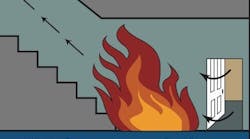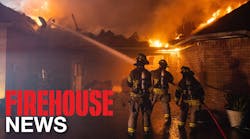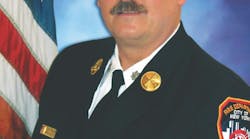The two go together and what's most disturbing is that these alarming statistics received only routine media coverage which is part of the problem. It was summed up by Meri-K Appy, the NFPA's vice president for public education, who said: "Sadly, fire is not a serious concern for most Americans and as long as that attitude persists, so will the thousands of fire deaths that occur in this country each year."
According to the NFPA, 4,990 people were killed in fires in 1996 and, as always, 81% of these deaths occurred in the home. More than 25,000 were injured, but that is believed to be a low estimate because many injuries are not reported. There was $9.4 billion in property damage, a 5.5% increase over the previous year, though the number of fires (1.9 million) stayed the same.
This upswing in fatalities and property loss comes after many years of a declining trend. Through most of the last decade, the annual death toll was about 6,000, then showed a sharp decrease after smoke detector laws were passed by local and state governments. The fire service became involved in public education campaigns on the need for detectors and it produced positive results.
It's not possible to determine whether last year's increase is merely a blip on the chart or the start of a bad trend. Nor is there an explanation as to why it happened other than the NFPA poll which revealed the public's appalling misconceptions about the fire danger. For example, it showed that 58% of those questioned believe they have more than two minutes to get out of a building when a fire is discovered and 24% think they have as much as 10 minutes before their lives are threatened.
In practical terms, these statistics mean that most people have no understanding of how little time elapses before light, gray smoke turns into killing black smoke or how fast a deadly flashover can occur. The survey also revealed that only 7% think that fire is a major risk in their home. And, 22% admitted that their reaction to a smoke detector alarm was to treat it as a malfunction and remove the battery, though only 16% of those surveyed actually had low batteries.
The deadly misconceptions and attitudes reported by the NFPA are manifested in other ways. This column frequently has pointed out that people are afraid of crime, but do not believe they will be victims of a fire, which is why elected officials can get away with ruthlessly cutting fire department budgets. When it comes to the police department, they dare not trim one dollar. Almost any measure to combat crime more cops, tougher sentences, bigger prisons receives enthusiastic support; fire is short-changed and treated as "an accident."
The challenge is how to overcome public apathy toward fire safety. The solution is the same as it always has been: public education along with the enactment and strict enforcement of tough fire codes. And, fire departments must have the money, equipment and staffing to do their job in both fire suppression and prevention. In simple terms, the American public cannot be trusted to protect itself from fire.
The idea that fire is "accidental" has to be replaced with the realization that it can be prevented and usually is caused by people doing stupid things. Fires caused by overloaded electric circuits, careless smoking and children left alone to play with matches are not "accidental" events. There may not be a criminal intent, like a robbery or burglary, but the effect is the same in terms of lives and property being destroyed. At some point, our society has to give up its tolerance of careless human behavior.
Fire chiefs on the scene of a fire often use a kind of shorthand to describe the cause of a fire as "undetermined" or "suspicious" or "accidental." Maybe we need a new category "stupidity." How refreshing it would be to see a news story in which the chief told reporters that a fire in which someone left food cooking on a stove was caused by "stupidity." That's much more accurate than labeling it "accidental."
Which leads to a possible solution: laws that make it a misdemeanor crime if a fire caused by a careless act results in property damage. And, if someone is injured or killed in a fire, the person who caused it should be charged with a felony offense, as they are in automobile accidents. If a person can be fined or jailed for reckless driving, why can't the same thing happen if their reckless behavior causes a fatal fire or severe property damage?
It's done in other countries and it works. But arsonists are the only ones prosecuted for causing fires in the United States. Occasionally, a building owner who has been grossly negligent will be fined for code violations that resulted in a serious fire. But most of the time people are rewarded with an insurance payoff even if their own careless actions caused a fire. When it comes to dealing with fire, our system is just as stupid as our citizens.
Hal Bruno, a Firehouse® contributing editor, is a political analyst with ABC News in Washington and served many years as a volunteer firefighter.




